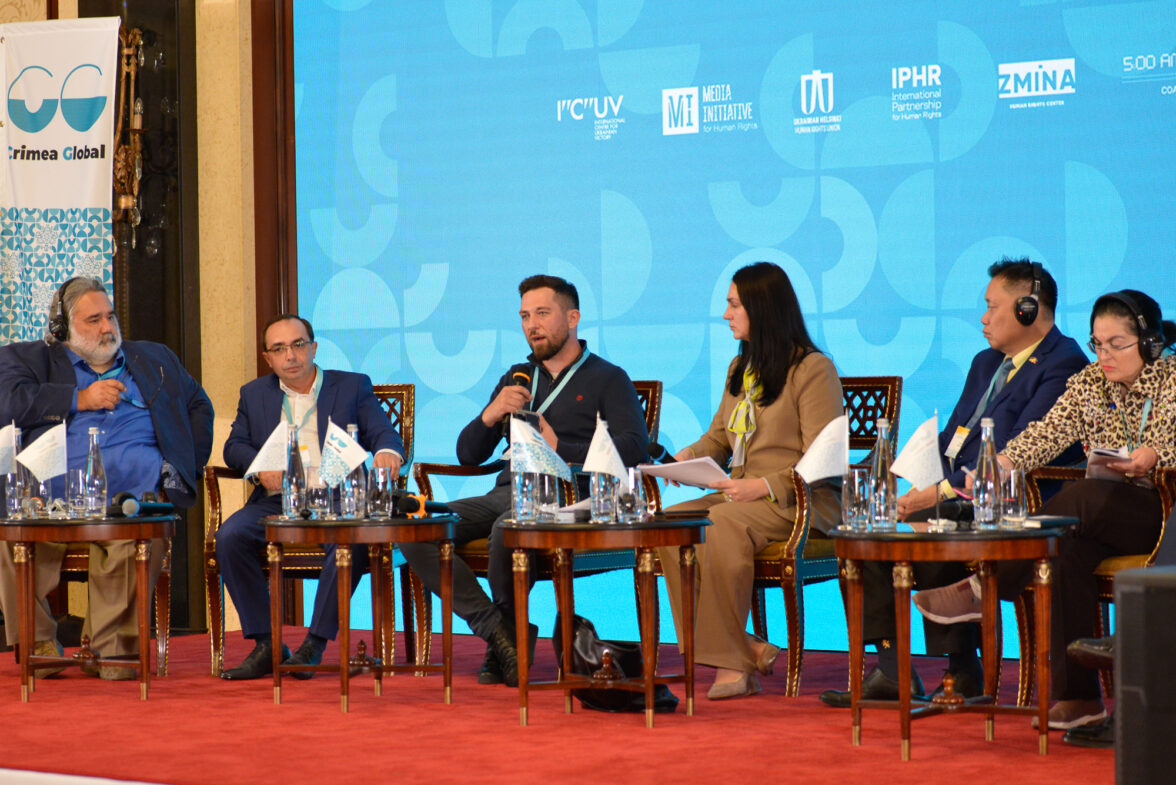THE SECOND PANEL DISCUSSION, “GLOBAL FOOD SECURITY: FEEDING THE WORLD FROM UNDER THE RUSSIAN MISSILES AND AMIDST THE ECOCIDE”
The second panel discussion, “Global food security: feeding the world from under the Russian missiles and amidst the ecocide,” focused on the current challenges in Ukraine’s agriculture during the war. The panel was moderated by Hanna Hopko, co-founder of the ICUV – International Center for Ukrainian Victory, Head of Foreign Affairs Committee and Member of Ukrainian Parliament (2014-2019).

The first component featured a discussion with Ukrainian farmers and traders, where they described the losses of their farms during the occupation and shared their views on future scenarios for economic recovery.
The first to address the participants was Vadym Svietlov, Head of Farm enterprise “Svetlova” in Sumy region. His enterprise operates under constant shelling from Russian forces and deals with mined fields. He emphasized that there are countless challenges faced by his company due to its proximity, only 5 km from the aggressor’s border. Due to the shortage of labor resulting from mobilization and the high number of refugees, many areas of his agricultural activities are suffering losses.
“We need security – when drones and missiles are flying overhead, we cannot work effectively. Every day we risk our lives and stay on our land to provide food for Ukraine and the world,” said Vadym Svitlov, Head of “Svetlova” enterprise.
The next panelist was Serhiy Leonov, Head of Rovy Agro LLC in Chernihiv region, which operates under constant shelling from Russia and has survived the occupation. The entrepreneur shared the horrific realities of life under Russian occupation, when the enemy destroyed equipment and mined fields.
“Under the occupation, all the usual logistics were disrupted, so we had to take a 50-kilometer detour to get to the fields. Also, 70% of our equipment was destroyed by the occupiers,” commented Serhiy Leonov, Head of Rovy Agro LLC.
The second component of this panel discussion was devoted to the impact of full-scale Russian aggression on global food security. Experts from Ukraine, Turkey, the Philippines, and Mexico joined the discussion.
The first to speak was Yoruk Işık, a geopolitical analyst, founder of the Bosphorus Observer, and a nonresident fellow at the Middle East Institute in Washington, DC. He is certain – the theft of grain, coal and other resources from the occupied Ukrainian territories by the Russian Federation is a crime for which it must be held accountable.
“Millions of Ukrainian grain illegally stolen by Russia have ended up on the world market. The aggressor had been preparing for this scenario, purchasing cargo ships for this purpose long before launching a full-scale invasion,” noted Turkish geopolitical analyst Yoruk Işık.
“Iran buys grain from Russia – thus, Russia pays for the murderous Shahed drones [note: they were nicknamed in mass communication] with stolen grain,” added Turkish geopolitical analyst Yoruk Işık.
The next speaker was Aribel Contreras Suarez, an analyst specializing in global issues at COMEXI think tank. She expressed concern about the threat to Global South countries, stating that while they were previously at risk of a food crisis, they now face a genuine food security threat.
“Ukraine provides a significant portion of the components of our daily sustenance. Russia’s actions directly jeopardize global food security,” pointed out Ariabel Contreras Suarez, an analyst at the COMEXI.
She also emphasized that by assisting the Russian Federation in selling stolen grain, nations are distancing Ukraine from victory and peace and the world from food security.
Monsey Serrano, a Philippine business and change management consultant, also joined the discussion. He emphasized the need for better implementation of international sanctions, as more than 190 million people around the world are currently experiencing the effects of food insecurity.
“By canceling the Black Sea Grain Initiative, Russia wanted to create chaos and blackmail people with food. The Russian Federation is putting many countries at risk of starvation, including the countries of the Global South,” said Monsey Serrano, a Philippine business and change management consultant.
In addition, he stressed the importance of not succumbing to the aggressor’s blackmail and pressure, urging the international community to apply pressure and develop effective mechanisms to counter the aggressor at the food level.
Pavlo Panasyuk, a Ukrainian innovator in agriculture, also shared his perspective on the global food crisis. The expert said that the only valid strategy for Ukraine in the food sector now is to be proactive. He emphasized a number of obstacles that the war has brought to Ukraine’s agricultural sector, such as the destruction of the Kakhovka hydroelectric power plant by Russia, labor shortages, pollution and land mines.
“The Russian Federation still has a powerful weapon – it remains a top player in the global fertilizer market. The aggressor state is still enriching itself through the export of this resource,” emphasized Pavlo Panasyuk, a Ukrainian agricultural innovator.
The participant also added that the modern world is in a state of interconnectedness, and therefore the problems of one state become challenges for others. All countries need to understand the root causes of the tragic events currently faced by Ukraine to prevent similar issues in the future.